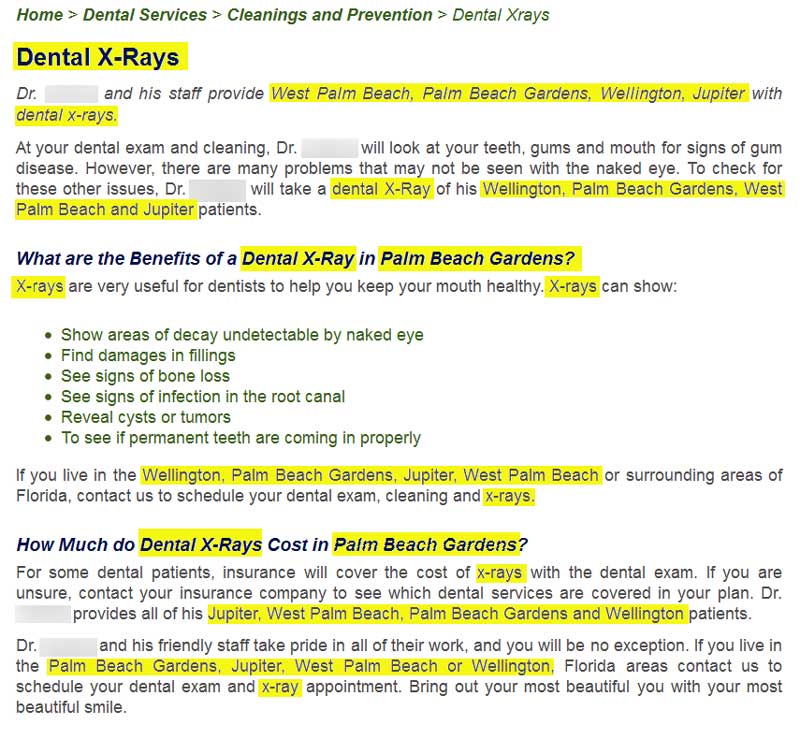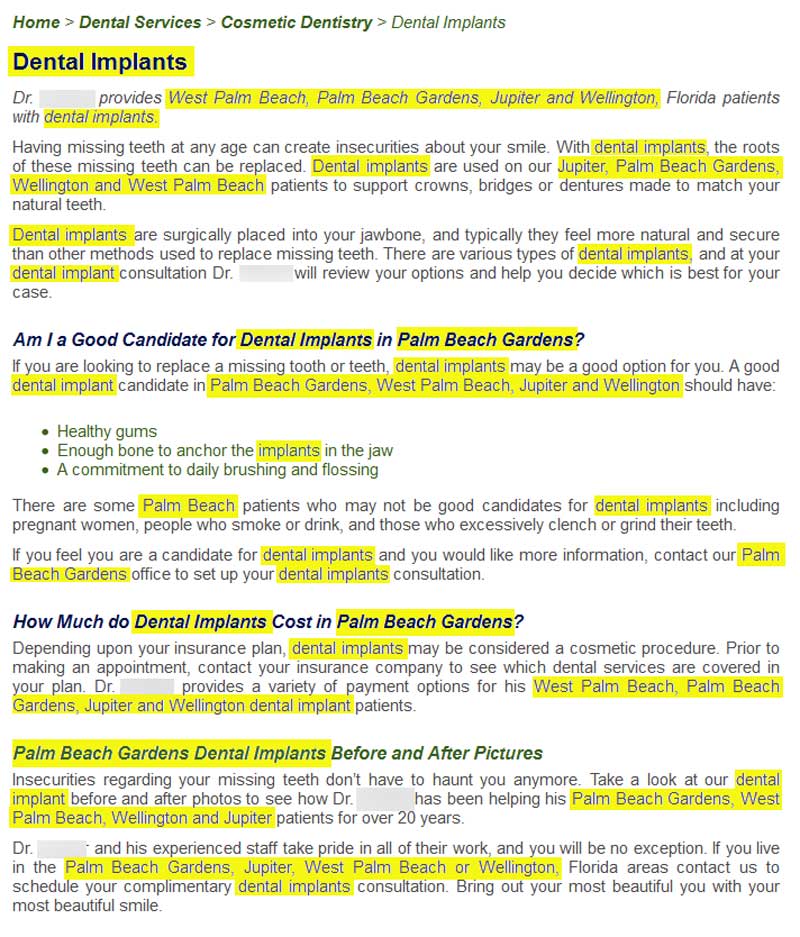 I’m a BIG fan of SEO done right. I believe good SEO is some of the best money and effort you can spend on your website… to a point. Many, including myself, have preached that “content is king.” Ultimately, CONTENT is what CONVERTS (visitors into patients).
I’m a BIG fan of SEO done right. I believe good SEO is some of the best money and effort you can spend on your website… to a point. Many, including myself, have preached that “content is king.” Ultimately, CONTENT is what CONVERTS (visitors into patients).
Three keys to winning with websites.
To review my tenets of dental website success:
- Get them TO your website (SEO, SEM, and other marketing).
- KEEP them ON your website (compelling content).
- Get them to take ACTION (make an appointment by calling or email contact form).
That’s it! Get those three things in place, and your website will perform! Unfortunately, some website designers (trying to keep dentist-clients happy) focus too much on one thing.
Too much of a good thing.
This blog article is about how one aspect of SEO can be over-done. Keywords are an important part of SEO.  And, we want to pepper our website copy with keywords that will be picked up by the search engines. Keywords are, quite simply, what people are putting in the little box before they click the “search” button. The search engines then try to find the most relevant webpages. Naturally, the more times a web page mentions a keyword, the more “relevant” it appears to search engines… to a point. There is such a thing as “too much” when it comes to keywords. That’s called “keyword stuffing.”
And, we want to pepper our website copy with keywords that will be picked up by the search engines. Keywords are, quite simply, what people are putting in the little box before they click the “search” button. The search engines then try to find the most relevant webpages. Naturally, the more times a web page mentions a keyword, the more “relevant” it appears to search engines… to a point. There is such a thing as “too much” when it comes to keywords. That’s called “keyword stuffing.”
I’m stuffed!
There can be some downsides to keyword stuffing. The first is that Google will catch on to these efforts to trick the search engine into ranking a page highly. That can result in your website being demoted or delisted by Google. The second (and perhaps just as significant) problem is that the copy doesn’t read well to the HUMAN visitor on the website.
Website copywriting “don’ts.”
Today, my hygienist emailed me a link to a site she thought was poorly-written. She was right. I picked two pages from the site to illustrate how keyword stuffing just makes a website nearly unreadable gibberish to a human. At the very least, it reads awkwardly and forces the reader to filter a lot of the keyword-filler to get to a miniscule amount of usable or even remotely interesting information. The reality is that the reader will hit the “back” button, instead… and go somewhere else. People looking for a dentist on the web are looking for INFORMATION. Who is this dentist? Why should I go there?
Below is a page about x-rays on the website. I’ve blocked out the dentist’s name. I’ve highlighted the keywords in yellow. In this case, the keywords would be “Dental X-rays” and the geographic location. Mind you, these ARE important to have in the copy.
But, this is a very good example of being “overdone” or “keyword stuffing.” It might even work well to get the site ranked highly (for a while) in the search results. BUT, it simply reads awkwardly to humans. I believe it will fail to accomplish the primary directive of a website: attract and convert new patients.
 More of the same.
More of the same.
And, here is the page about dental implants that follows the same pattern. Man! There’s a lot of yellow here!

Trying to be everything to everybody.
Yes… you should season your copy with relevant keywords like “dental implants” and your location. I would also caution against casting too wide of a geographic net. This case is an example of that, too. Consider whether it’s realistic that you’d attract patients from cities that are a good distance away. Also consider that by including distant geographic references, you may be diluting your SEO for the city you’re actually in. I’m not saying you shouldn’t cast a wide net. I’m simply saying you should weigh reality vs. trying to cover every conceivable location, and create your content accordingly.
Write for your human audience.
The main message here is that if you write good, readable, and coherent copy for your human website visitors, it will “automagically” perform well in the search engines. My point is that search engines will naturally like well-written copy. Don’t try to trick the search engines. It might work (for search results) on a temporary basis. But, even if it does “impress” the search engines, Google doesn’t have teeth and can’t sit in your chair. Ultimately, you need to impress real people with teeth that desire your services.
What do you think?
It’s difficult asking dentists to think like a consumer. But, try anyway and see how the copy in the two webpages above read to you? Are they compelling? Do they answer your questions (as consumer / prospective patient)? Do you get tired of reading and jumping over, “Palm Beach Gardens, West Palm Beach, Wellington, and Jupiter?” Post your opinions and comments below!
PS…. Other articles I’ve written on the subject:
You Never Know What They’ll Search For on Google
Website Marketing Pearl: Help them find what they’re looking for!
Google-proof Your Website
Defy the “back” button. Be yourself – online!
This Time It’s Personal – Your website, that is.
 Copyright protected by Digiprove © 2013 The Dental Warrior®
Copyright protected by Digiprove © 2013 The Dental Warrior® 
Mike, got a question for you about the keywords related to location, as I would like to improve my website optimization for the areas AROUND Charlotte, not just Charlotte itself, as there are many large suburbs from which we draw. What are some good ways and/or good places to add those town names into the website so Google will associate my site with them for SERPs, but without overdoing it as in these examples?
(BTW – the next article on image protection should be ready by the end of the weekend – just having some formatting issues and need a couple extra screenshots.)
That’s a good question, Chip. I have optimized my site for multiple areas surrounding my town. Mostly I’ve done it in title tags. But, I see many sites (like the one featured in this post) that over-do it in the copy on the page. It’s just annoying to read. Or as my friend, Jeff Gladnick (www.GreatDentalWebsites.com) said… “obnoxious.”
Another idea worth considering is building a separate website for each major geographic location. Whattaya think? 🙂
That guy must be the president of the Department of Redundancy Department.
Another way to help with directing patients to your geographical location is when writing a blog, indicate the name of your business and where you are located in each blog post.
True, Frank. Search engines LOVE blogs. But, the same rules of copywriting apply. Don’t repeat the location and service in every single sentence, over and over and over.
If you write well for human readers, it will also read well for search engines. If you write just for the search engines, it won’t read well to humans. And, it’s the humans you hope will be compelled to make an appointment and sit in your chair.
Perfectly stated. There’s nothing worse than reading copy of a site that’s not worried about content. It’s an automatic turn off. Good copy has an appropriate amount of keywords in it already.
Damn, Alan! You summed up my entire article in a single sentence! 😀
Yep. Mentioning your location once per blog post is all that is necessary.
We had a major revamp of our UK website in January, new design etc., and as part of this we rewrote the copy for the site – with the intention prinicipally of making the content more attractive and easy to read / understand for visitors.
While our position in the SERPS hasn’t increased that much our visits has gone up by over 25% and our call backs has more than doubled.
I guess content, whether it be blog posts or just a general rewrite of on page content, can have tremendous value.